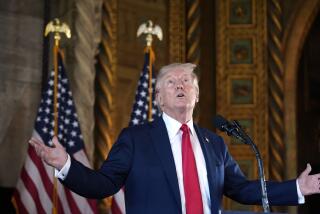Book Says Brown Had Ties to ‘Fixer’
- Share via
SACRAMENTO — It’s been a decade since legendary Hollywood fixer Sidney Korshak was buried following a half-century of rubbing elbows with mobsters, movie executives and politicians.
Now tales of the late lawyer’s colorful career -- relegated to newspaper archives and dusty FBI documents -- could reemerge as political fodder in the contest for California attorney general.
A book scheduled for release next week revives decades-old allegations that Democratic candidate Jerry Brown, during his years as California governor, maintained political links to Korshak and other figures with alleged ties to organized crime.
Brown’s opponent in the attorney general’s race, Republican state Sen. Chuck Poochigian of Fresno, intends to shine a spotlight on the book, “Supermob: How Sidney Korshak and His Criminal Associates Became America’s Hidden Power Brokers.”
Published by Bloomsbury USA and set to hit sales racks next month, the book by investigative journalist Gus Russo charges that Brown took campaign contributions from Korshak and unions with suspected mob ties during the 1970s, and then granted them political favors.
Brown’s campaign strategist, Ace Smith, flatly rejected the book’s allegations, calling them moldering nonsense that should be left entombed.
“It’s laughable and idiotic,” Smith said. “It’s in the same category as Bigfoot and the Loch Ness monster. If you’re looking for information like that, you should check out Al Capone’s vault.”
A spokesman for Poochigian, who trails Brown by more than 20 points according to a recent poll, said the rehashed charges against Brown should not be ignored.
“Jerry Brown is seeking to be the chief law enforcement officer of California,” said Kevin Spillane, a Poochigian spokesman. “Of course published allegations of Brown receiving campaign support from underworld figures and giving them favors in return should be seriously examined.”
In an interview, Russo said the timing of the book’s release had nothing to do with Brown’s candidacy. But “I would question anyone running for political office who would curry that kind of favor,” Russo said.
Brown is mentioned on 17 pages in Russo’s 640-page book, which chronicles the rise to power of a group of well-connected power brokers led by Korshak, an “almost vaporous player” behind some of the “shadiest deals” of the 20th century: California land grabs, casino monopolies and Hollywood quid pro quos.
Russo describes Korshak, a quiet, camera-shy Chicago native who came west to serve for decades as “the underworld’s primary link to the corporate upperworld” before his death in 1996, as a longtime chum of Brown’s father, former California Gov. Pat Brown.
When the son ran for the state’s highest office in 1974, he knew he couldn’t afford a credible campaign “without going to the same gentry and Supermob that had supported his father,” Russo writes.
Jerry Brown received “massive contributions” during the 1974 gubernatorial race from friends and associates of Korshak, the book contends. During his reelection campaign four years later, Brown’s association with Korshak “became a major point of criticism and even mockery,” the book says.
Newspapers noted Korshak’s attendance at a $1,000-a-plate Beverly Hills fundraiser for Brown in 1978 after a report on organized crime by then-state Atty. Gen. Evelle Younger named the influential labor lawyer “the key link between organized crime and big business.”
According to the book, Younger’s report said Korshak, though never indicted, had been the subject of several FBI investigations and had been linked to organized crime since the 1940s. One U.S. Justice Department official described Korshak as a senior advisor to organized crime groups in California, Chicago, Las Vegas and New York. Korshak denied the charges.
Korshak took a Teamster chief and his wife as guests to the Brown fundraiser, which raised $50,000 from a guest list culled in no small part from Korshak’s personal address book. Another $50,000 contribution, Republicans charged, came from an arm of the Teamsters.
Brown then appointed the brother-in-law of a union boss to the board that named concessionaires at the state’s racetracks and county fairs, the book contends. Russo alleges that the profits from concessions were “skimmed” and sent to reputed mob figures.
Russo’s book also asserts that Korshak attempted unsuccessfully in 1979 to force a total shutdown of Hollywood Park racetrack during an labor impasse intended to “pave the way” for an organized crime takeover of the track.
“Just then, Governor Brown played into Korshak’s hands” by trying to close the track, citing safety risks with critical employees on strike, according to Russo’s book. Brown, at the time, said he made the move to demonstrate that he was “pro-labor.”
“Not long after siding with Korshak at Hollywood Park,” the book says, Brown traveled to New Hampshire to campaign in the state’s presidential primary. He was aided in campaigning there by Service Employees International Union, which represented workers at the Southern California racetrack.
More to Read
Sign up for our Book Club newsletter
Get the latest news, events and more from the Los Angeles Times Book Club, and help us get L.A. reading and talking.
You may occasionally receive promotional content from the Los Angeles Times.










